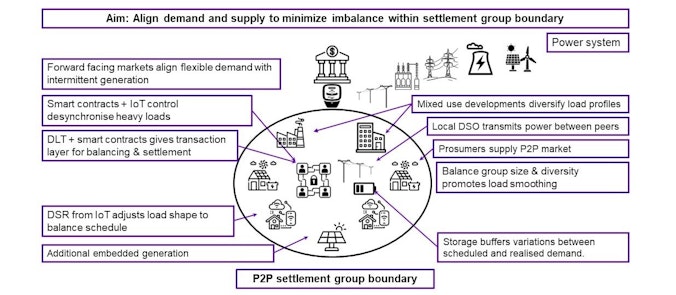Global observatory on peer-to-peer energy trading
This report is part of Today in the Lab – Tomorrow in Energy?
Today in the Lab – Tomorrow in Energy? shines a spotlight on research projects under development in the Technology Collaboration Programmes (TCPs). Learn more about the initiative, read the launch commentary, or explore the TCPs.
International forum contributing to wider deployment of peer-to-peer energy trading
What is the aim of this activity?
The Global Observatory on Peer-to-Peer, Community Self-Consumption and Transactive Energy Models (GO-P2P) is a forum under the Users TCP for international collaboration to understand the policy, regulatory, social and technological conditions for the wider deployment of peer-to-peer energy trading (P2P), community self-consumption (CSC) and transactive energy (TE) models.
GO-P2P aims to provide policy makers, businesses and non-profit organisations with an assessment of the key factors enabling or inhibiting the rollout of P2P/TE/CSC models by studying trials in Australia, Belgium, Ireland, Italy, The Netherlands, Switzerland, the United Kingdom and the United States. International comparative analyses will lead to the formulating of a Readiness Index, helping stakeholders assess a country’s readiness for P2P/TE/CSC model deployment.
How could the activity be explained to a high school student?
Imagine you could produce your own electricity by installing solar panels on the roof, and share leftover energy with friends or neighbours who need it. Not only will you be helping the planet by generating and using green energy, but you will also be supporting people in your community. Like AirBnb and Uber, peer-to-peer energy trading allows people to sell electricity to others directly.
Peer-to-peer energy trading is being tested in many places, from London (United Kingdom), where residents in social housing exchange energy left over from their share of a communal solar panel with each other, to Medellín (Colombia), where residents of disadvantaged areas sell self-produced energy to residents of wealthier areas. Our project compares such experiments to find out what makes them successful.
How does the activity help to achieve climate and energy goals?
- Supports greater penetration of distributed renewable energy by providing grid-edge balancing (carbon efficiency).
- Reduces distribution system reinforcement costs (economic efficiency).
- Creates new business models delivering existing and new energy services to customers (energy efficiency).
- Creates greater end-user understanding and engagement in energy (consumption intensity and social engagement).
What government policies could advance this activity?
- Prioritising uptake of advanced metering infrastructure (“smart meters”).
- Allowing consumers to have several energy suppliers at the same time (“multiple supplier” models).
- Allowing demand response to compete fairly with storage capacity mechanisms.
- Recognising and enabling community energy groups to become service providers on the grid.
- Reducing social and environmental taxes and charges from consumers’ electricity bills.

Glossary of abbreviations: CSC - community self-consumption, DLT - distributed ledger technologies (‘blockchains’),DSO - distribution system operator, DSR - demand side response, IoT - Internet of things, P2P - peer-to-peer energy trading
Video presentation
Partners and funders
Partners
- Lucerne University of Applied Sciences and Arts (Switzerland)
- International Energy Research Centre (Ireland)
- Carnegie Mellon University (United States)
- University of New South Wales (Australia)
- European University Institute/Florence School of Regulation (Italy)
Funders
EnergyREV consortium
Expected project duration
September 2019 - March 2023
Learn more
About the Users TCP
The mission of the Users TCP is to provide evidence from socio-technical research on the design, social acceptance and usability of clean energy technologies to inform policy making for clean, efficient and secure energy transitions.